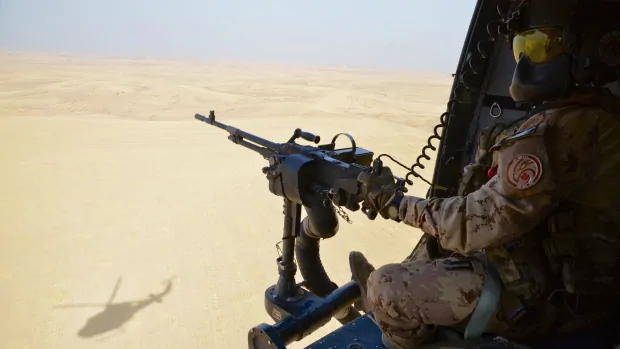Canada pulls military trainers out of Iraq as pandemic spreads

A significant number of Canadian military trainers have been redeployed out of Iraq to Kuwait as the federal government temporarily “contracts” the size of its overseas missions in response to the pandemic, a senior defence source told CBC News.
The military is calling it a “repositioning of forces” because, at the moment, the COVID-19 outbreak has left fewer Iraqi troops available for training in the war-torn country, said the official who spoke on background because of the sensitivity of the file.
The general instability in Iraq, which followed the United States’ targeted killing of Iranian special forces commander Gen. Qasem Soleimani, is also a factor, the source added. Iran’s proxy militias have launched 15 attacks on U.S.-led coalition forces in recent weeks.
The reordering of forces in Iraq is only temporary and those troops will not be brought home, the defence official said.
Canada has had about 500 troops in Iraq, operating under both NATO and the U.S.-led anti-Islamic State coalition. NATO announced Thursday it had agreed to take over some of the military training of Iraqi non-commissioned officers and police from the coalition.
Canada scales back
Canada leads the NATO training mission in Iraq. It’s not clear how many troops were moved to Kuwait over the last few weeks.
The decision to send them out of the country follows on a move last week to scale back Canadian forces in Ukraine, where 200 Canadian soldiers have been conducting a military training mission.
A fresh rotation of troops had been set to deploy to the training centre near Lviv, in the western part of Ukraine, but that deployment has been scrubbed and the existing contingent will come home. Only a token force of 60 soldiers will remain behind to “keep the lights on” until there is a full resumption, the defence official said.
The coronavirus crisis will not lead to any changes for the roughly 450 Canadian troops leading a NATO battle group in Latvia, which is intended to deter Russian aggression in the Baltic states.
Since the pandemic was declared, several defence experts have predicted that the Canadian military’s overseas footprint would shrink as more and more troops are called home to respond to anticipated calls for pandemic assistance from provinces and northern communities.
NATO boosts airlift capacity
COVID-19 was top of the agenda for NATO foreign ministers when they met Thursday in an extraordinary, secure-link video conference.
NATO Secretary General Jens Stoltenberg said at the conclusion of the meeting that ministers had agreed to step up airlift capacity among the 30 nations to ensure that urgent medical supplies are delivered to countries in need. The alliance also is going to help coordinate offers of support among members and partner nations.
“NATO was created to deal with crises,” Stoltenberg told a video news conference. “So we can help.”
The alliance’s top commander stressed recently that the pandemic has not affected military operations or deterrence measures in Eastern Europe.
Multiple defence observers and analysts in the U.S. and Europe have suggested that the extraordinary distraction of the COVID-19 crisis would present an opportunity for Russia to interfere in the Baltic states.
NATO took note of a snap military exercise in Western Russia recently and an increased Russian naval presence in the North Sea. Stoltenberg said the alliance remains vigilant.